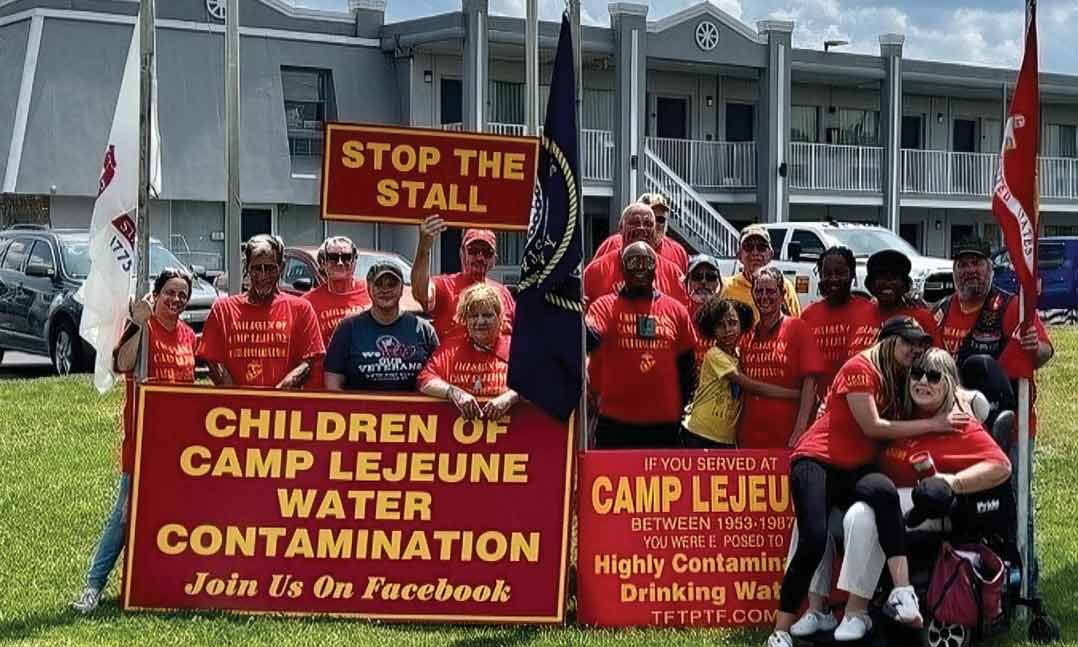When the Honoring Our PACT Act was signed into law a year ago this month, VFW Post 9133 Commander Wendy Silvera thought to herself that her Post needed to do its part to help those in her community affected by the new law.
“Everyone witnessed what the VFW had done to make sure that the PACT Act was passed,” said Silvera, a retired Marine.
“It’s the biggest piece of veterans legislation ever. As a Post commander, I felt we needed to do our part in the community. And we are already seeing the impact on our veterans.”
 VFW Post 9311 members and the “Children of Camp Lejeune,” who were exposed to toxic water on the Marine Corps base in North Carolina, gather on April 29 in Jacksonville, N.C., for the Stop the Stall rally to demand action from the Department of the Navy related to the Camp Lejeune Justice Act.Having her Post located just five miles from Camp Lejeune in Jacksonville, North Carolina, she knew there would be many veterans and families who needed help with claims related to the Honoring Our PACT Act, as well as help with their options regarding the Camp Lejeune Justice Act.
VFW Post 9311 members and the “Children of Camp Lejeune,” who were exposed to toxic water on the Marine Corps base in North Carolina, gather on April 29 in Jacksonville, N.C., for the Stop the Stall rally to demand action from the Department of the Navy related to the Camp Lejeune Justice Act.Having her Post located just five miles from Camp Lejeune in Jacksonville, North Carolina, she knew there would be many veterans and families who needed help with claims related to the Honoring Our PACT Act, as well as help with their options regarding the Camp Lejeune Justice Act.
The Honoring Our PACT Act is omnibus legislation focusing on providing veterans who served in countries such as Vietnam, Afghanistan and Iraq expanded access to VA health care and earned disability benefits. A part of that law is the Camp Lejeune Justice Act, which allows veterans and military families who were exposed to toxic water on the base from Aug. 1, 1953, to Dec. 31, 1987, to file a federal tort claim for harm caused by the exposure.
300 VETS AND FAMILIES HELPED
A veteran of the wars in Iraq and Afghanistan, Silvera said that, from the Honoring Our PACT Act’s signing in August 2022 through May 2023, she and other Post members have helped about 300 veterans and families near Camp Lejeune. Post 9133 members have helped those veterans and families with everything from filing VA disability claims to getting in touch with a VFW-entrusted attorney.
“We have been inundated with questions and requests to help many veterans in our area,” Silvera said. “These are people who greatly suffered, and we don’t want to give them the wrong advice.”
Silvera said that she and others in the community are frustrated. The Camp Lejeune Justice Act was made law a year ago, but the Department of the Navy, as of May, had yet to put out guidance on
one single case regarding the toxic water that harmed troops and families living on Camp Lejeune.
“The Navy has known about the water being toxic and harming veterans and their families for years, yet there is still not a solution or way ahead,” Silvera said in June. “These people are not numbers. It’s incredibly frustrating to watch our members and their families continue to die while the Department of Justice tries to figure out what to do.”
FIGHTING FOR HIS FAMILY
Wilbour “Mac” McNamee, a Vietnam War veteran and member of VFW Post 9133, is another person helping with PACT Act claims. He knows all too well how the toxic water at Camp Lejeune has negatively affected veterans and families.
Silvera said McNamee’s daughter, who grew up on the base, died at a young age. McNamee’s wife, Rita, also got stage 4 lung cancer. Rita worked on base, and Rita’s son, who attended daycare at Camp Lejeune, got cancer, according to Silvera.
Silvera said McNamee and other veterans like him are the reason she’s an advocate.
“[McNamee] has been through enough,” Silvera said. “This is why we are working so hard to help veterans in our community and do what’s best for them.”
A member of Post 9133, Brad Blackburn, said he has, on average, helped file 30 claims a month, all related to the PACT Act. Because of the high demand, Blackburn has office hours twice a week at the Post to facilitate those needs.
Blackburn is an Army veteran (1981-1990) who served in South Korea in 1982 and from 1986 to 1987. He said that it is common for people to confuse the PACT Act and Camp Lejeune Justice Act as being the same.
“It is not,” Blackburn said. “We are having to explain the differences between the two.”
Blackburn said that he expected there to be a higher volume of VA disability claims being filed after the PACT Act was made into law.
“The PACT Act affects so many individuals — it goes back all the way to World War II,” Blackburn said. “There have been a lot of questions about what conditions are related to the PACT Act.”
Silvera said that it is important to remember that real people who served their county are associated with the PACT Act, the full title being the Sergeant First Class Heath Robinson Honoring our Promise to Address Comprehensive Toxics Act (P.L. 117-168).
“There is a person attached to the name of this law,” Silvera said. “We must treat that with the respect these veterans and families deserve. And this is where the VFW comes in to remind everyone
that we have been fighting for years.”
This article is featured in the 2023 August issue of VFW magazine, and was written by Dave Spiva, associate editor for VFW magazine.